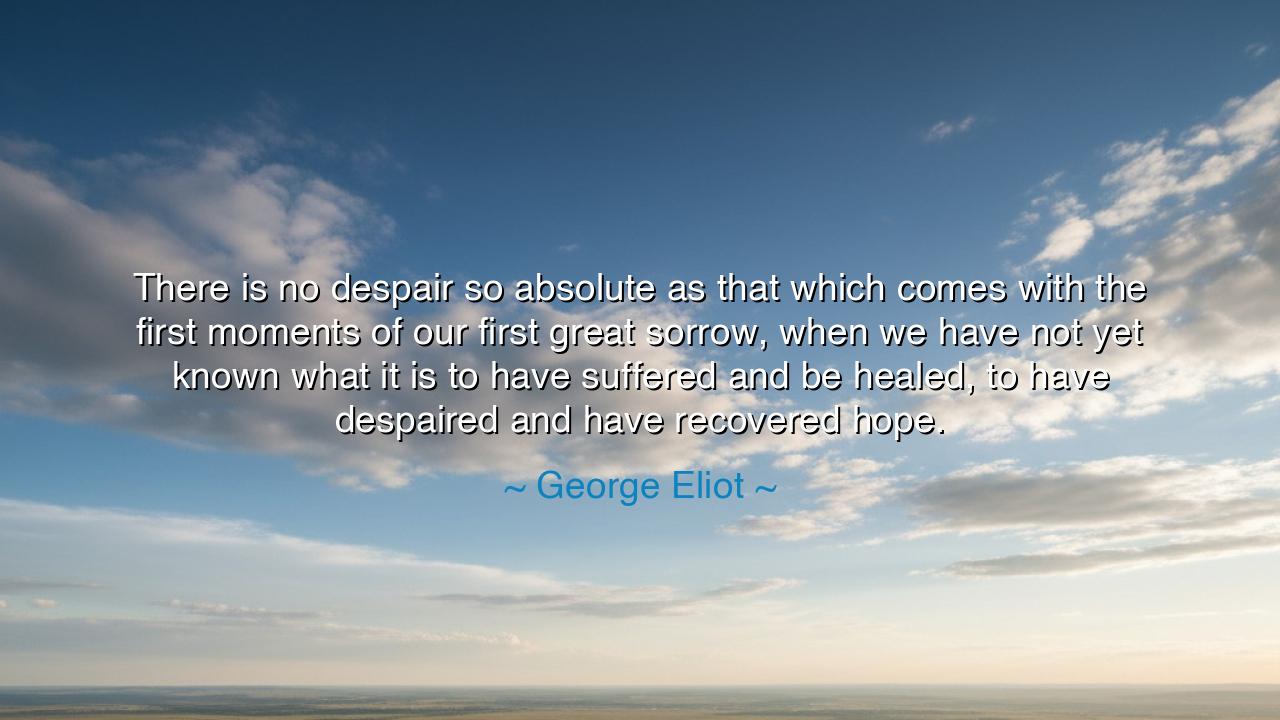
There is no despair so absolute as that which comes with the
There is no despair so absolute as that which comes with the first moments of our first great sorrow, when we have not yet known what it is to have suffered and be healed, to have despaired and have recovered hope.






In the words of George Eliot, “There is no despair so absolute as that which comes with the first moments of our first great sorrow, when we have not yet known what it is to have suffered and be healed, to have despaired and have recovered hope.” These words pierce the heart with their deep understanding of the human soul. They speak of that first encounter with grief, that terrible awakening when the bright certainty of youth shatters, and we first learn that life carries within it both joy and loss. Eliot’s wisdom is ancient and compassionate — she reminds us that the pain of that first sorrow feels infinite only because we do not yet know that pain can pass, that healing can follow despair, that the heart, though broken, can be remade stronger than before.
The origin of this quote lies in Eliot’s own profound sensitivity to human suffering. Born Mary Ann Evans, she wrote under a man’s name in the 19th century, seeking freedom to express truths that were too vast for the conventions of her time. Her novels — Middlemarch, Silas Marner, The Mill on the Floss — were not only works of literature but acts of moral courage, filled with the raw pulse of human emotion. Having known isolation, heartbreak, and spiritual struggle herself, Eliot understood the landscape of despair. This quote, drawn from Adam Bede (1859), reflects her own journey — from faith to doubt, from pain to compassion, from sorrow to wisdom. She writes not as a philosopher apart from life, but as one who has descended into the depths and returned bearing the lamp of understanding.
When she speaks of “the first great sorrow,” she means that moment when a soul, still innocent of suffering, first collides with the inevitable losses of existence — the death of a loved one, the betrayal of trust, the failure of a dream. In youth, the world feels eternal, promises feel unbreakable, and happiness seems a birthright. So when sorrow first comes, it feels like the end of all things — for we have not yet learned that the human heart is capable of resurrection. The first despair is absolute because we do not yet know that despair itself is not final. The darkness feels endless because we have not yet seen the dawn.
History offers many who have walked this path. Consider Helen Keller, who as a young child fell into a world of silence and darkness after illness stole her sight and hearing. Her first years were filled with confusion and despair — she could not understand, could not speak, could not connect. That was her first great sorrow, her absolute despair. Yet through the patient guidance of her teacher, Anne Sullivan, she discovered not only language but meaning, not only light but purpose. Helen Keller later said, “Although the world is full of suffering, it is also full of the overcoming of it.” This is precisely Eliot’s wisdom made flesh — the truth that hope is born from endurance, that despair is not the end but the threshold to understanding.
Eliot also teaches us that sorrow itself becomes a teacher. Once we have suffered deeply and healed, we are never the same. We lose our childish illusions, but we gain something far greater — compassion, depth, resilience. The person who has known despair and risen again becomes like tempered steel, flexible yet unbreakable. When we meet others in their grief, our hearts know the way, for we have walked that dark road ourselves. This is why the elders, the wounded, the wise speak with such calm: they have suffered, and they have healed. They know that pain, though cruel, is also sacred — for it is the furnace in which empathy and faith are forged.
The lesson, then, is not to flee from suffering, nor to fear the first great sorrow when it comes. For though it may feel like the end, it is in truth the beginning — the initiation into the full measure of life. To live is to love, and to love is to risk loss. But it is in loss that we discover the boundless strength of the human spirit. When despair comes, remember Eliot’s words: that healing will follow, that hope will rise again, that the soul which has known despair and survived it has gained a power greater than innocence — the power of endurance and understanding.
So, my children of this present age, when your first great sorrow arrives — as it surely will — do not turn from it in fear. Let it pass through you, let it break you open, for in that breaking, the heart is enlarged. Know that one day you will look back and see that even in despair there was meaning, and that the pain which once seemed infinite became the source of your compassion. As George Eliot teaches, no despair is eternal, and no heart, once healed, remains fragile. For the soul that has learned to despair and recover hope carries within it the secret strength of all humanity — the knowledge that even in darkness, the light is never lost, only waiting to be found again.






AAdministratorAdministrator
Welcome, honored guests. Please leave a comment, we will respond soon